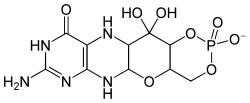Cyclic pyranopterin monophosphate
Cyclic pyranopterin monophosphate (cPMP) is an experimental treatment for molybdenum cofactor deficiency type A, which was developed by José Santamaría-Araujo and Guenter Schwarz at the German universities TU Braunschweig and the University of Cologne.[1][2]
 | |
| Names | |
|---|---|
| Other names
cPMP; Precursor Z | |
| Identifiers | |
3D model (JSmol) |
|
| ChemSpider | |
PubChem CID |
|
| UNII | |
CompTox Dashboard (EPA) |
|
| |
| |
| Properties | |
| C10H14N5O8P | |
| Molar mass | 363.223 g·mol−1 |
Except where otherwise noted, data are given for materials in their standard state (at 25 °C [77 °F], 100 kPa). | |
| Infobox references | |
cPMP is a precursor to molybdopterin, which is required for the enzyme activity of sulfite oxidase, xanthine dehydrogenase/oxidase and aldehyde oxidase.[3]
References
- Günter Schwarz; José Angel Santamaria-Araujo; Stefan Wolf; Heon-Jin Lee; Ibrahim M. Adham; Hermann-Josef Gröne; Herbert Schwegler; Jörn Oliver Sass; Tanja Otte; Petra Hänzelmann; Ralf R. Mendel; Wolfgang Engel; Jochen Reiss (2004). "Rescue of lethal molybdenum cofactor deficiency by a biosynthetic precursor from Escherichia coli". Human Molecular Genetics. 13 (12): 1249–1255. doi:10.1093/hmg/ddh136. PMID 15115759.
- Doctors risk untried drug to stop baby’s brain dissolving, TimesOnline, November 5, 2009
- José Angel Santamaria-Araujo; Berthold Fischer; Tanja Otte; Manfred Nimtz; Ralf R. Mendel; Victor Wray; Günter Schwarz (2004). "The Tetrahydropyranopterin Structure of the Sulfur-free and Metal-free Molybdenum Cofactor Precursor". The Journal of Biological Chemistry. 279 (16): 15994–15999. doi:10.1074/jbc.M311815200. PMID 14761975.
External links
- Guenter Schwarz Laboratory, Institute for Biochemistry - University of Cologne (English, German)
This article is issued from Wikipedia. The text is licensed under Creative Commons - Attribution - Sharealike. Additional terms may apply for the media files.